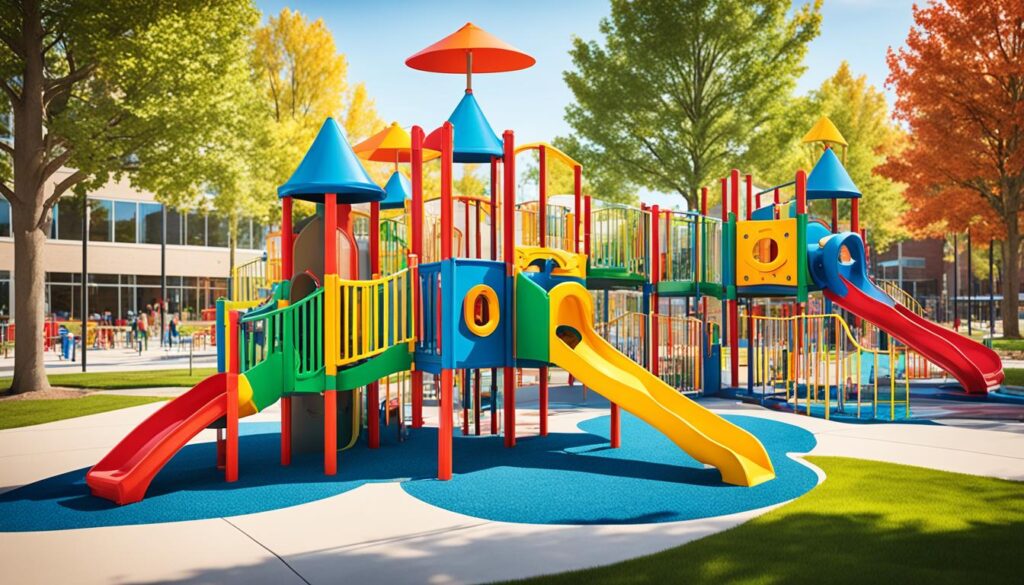A Bachelor of Education and Learning in Childhood is an undergraduate degree that prepares you to work with infants and children up to 8 years old. This degree focuses on teaching and shaping young minds during their crucial developmental years. The program includes coursework in child development, teaching practices, curriculum design, and classroom management.
Graduates of this program are equipped to pursue careers in early childhood education, including roles as preschool teachers, childcare center directors, and special education teachers. The demand for professionals with a childhood education bachelor’s degree is high, as society recognizes the importance of providing quality education during the early years of a child’s life.
Table of Contents
ToggleKey Takeaways:
- A Bachelor of Education and Learning in Childhood prepares you to work with infants and children up to 8 years old.
- The program includes coursework in child development, teaching practices, curriculum design, and classroom management.
- Graduates of this program can pursue careers as preschool teachers, childcare center directors, and special education teachers.
- The demand for professionals with a childhood education bachelor’s degree is high.
- Providing quality education during the early years of a child’s life is crucial for their development and future success.
Understanding the Early Childhood Education Degree
An early childhood education degree is offered at various levels, including associate, bachelor’s, master’s, and doctorate degrees. These programs aim to provide students with the knowledge and skills to effectively educate and assess young children.
The degree programs in early childhood education cover a wide range of topics, including:
- Child development
- Classroom management
- Literacy learning
- Teaching methods
Here is a breakdown of the different degree levels in early childhood education and their approximate durations:
| Degree Level | Approximate Duration |
|---|---|
| Associate Degree | About 2 years |
| Bachelor’s Degree | Minimum of 4 years |
| Master’s Degree | Varies, typically 1-2 years |
| Doctorate Degree | Varies, typically 3-5 years |
Upon completion of an early childhood education degree, graduates may pursue certification or licensure to work in public or private schools as teachers or pursue other careers in the field.
“An early childhood education degree provides the foundation for a rewarding career working with young children, shaping their futures and making a positive impact on their lives.”
Further specialization and career advancement opportunities are also available through additional education or certifications. With an early childhood education degree, you can embark on a fulfilling journey to inspire and educate young minds, creating a lasting impact on their educational development.
Specializations and Concentrations in Early Childhood Education
Within an early childhood education degree program, you have the opportunity to specialize or concentrate your studies, allowing you to delve deeper into specific areas of interest. These concentrations equip you with specialized knowledge and skills to meet the unique needs of different groups of children. Some common specializations and concentrations in early childhood education include:
- Bilingual or Dual Language Education: This concentration focuses on working with diverse populations and equips you with the skills to effectively engage and teach children who come from different language backgrounds. It emphasizes the importance of cultural inclusivity in early childhood education.
- Special Education: If you have a passion for working with children with developmental delays or disabilities, this concentration is for you. It prepares you to create inclusive and supportive learning environments and implement specialized strategies that cater to the unique needs of these children.
- Early Literacy: This concentration emphasizes the critical role of language and reading development in early childhood. You will learn effective techniques and strategies to promote literacy skills, such as phonics instruction, storytelling, and creating a print-rich environment.
These concentrations offer you the opportunity to make a significant impact on the lives of children and contribute to their overall development and success. With specialized knowledge and skills, you will be better equipped to address the specific challenges and needs that arise in these areas of childhood education.
When considering pursuing a bachelor’s degree in childhood education, it is important to choose a school or institution that offers a program aligned with your interests and goals. Below is a table highlighting some renowned childhood education schools:
| School | Location | Programs Offered |
|---|---|---|
| New York University (NYU) | New York, NY | Bachelor’s in Early Childhood Education |
| University of California, Los Angeles (UCLA) | Los Angeles, CA | Bachelor’s in Child and Adolescent Development with a Concentration in Early Childhood Education |
| University of Michigan | Ann Arbor, MI | Bachelor’s in Early Childhood Education and Teaching |
These are just a few examples of institutions that offer childhood education programs. Remember to research and explore different schools based on your preferences and location to find the perfect fit for your educational journey.

Visualizing yourself in a career where you positively impact the lives of young children through education and nurturing is a fulfilling and rewarding choice. By specializing in a specific area of childhood education and choosing the right education institution, you can embark on a successful journey in this field.
What Can You Do with a Bachelor's in Early Childhood Education?
Graduates with a bachelor’s degree in early childhood education have a wide range of career options in the field of education. Here are some common job options to consider:
- Preschool Teacher
- Special Education Teacher
- Teacher Assistant
- Childcare Center Director
- Nanny
These professionals work in various settings, including public and private schools, childcare centers, and even in-home care. They play a vital role in shaping young minds and creating a nurturing and educational environment for children.
Preschool teachers are responsible for planning and implementing developmentally appropriate curricula, fostering social and cognitive development, and assessing children’s progress. Special education teachers work with children who have developmental delays or disabilities, providing individualized support and adapting teaching methods to meet their unique needs.
Teacher assistants provide valuable support to teachers in managing classrooms, preparing materials, and working directly with students. Childcare center directors oversee the daily operations of childcare facilities, ensuring quality care and educational experiences for young children. Nannies work in private homes, providing personalized care and educational support to children.
Additionally, a bachelor’s degree in early childhood education can open doors for career advancement and further specialization. Some individuals may choose to pursue advanced degrees, such as a master’s or doctorate in early childhood education, to take on leadership roles in the field. Others may seek out additional certifications or specializations, such as bilingual or dual language education, to work with diverse populations. These pathways allow professionals to deepen their knowledge and expand their career opportunities.
| Career Option | Job Description | Settings |
|---|---|---|
| Preschool Teacher | Plan and implement age-appropriate curricula, assess children’s progress, and promote social and cognitive development | Public and private preschools, child development centers |
| Special Education Teacher | Provide individualized support and specialized instruction to children with disabilities or developmental delays | Public and private schools, special education programs |
| Teacher Assistant | Assist teachers in managing classrooms, preparing materials, and working directly with students | Public and private schools, childcare centers |
| Childcare Center Director | Oversee the daily operations of childcare centers, ensure compliance with regulations, and provide leadership to staff | Childcare centers, early learning centers |
| Nanny | Provide personalized care and educational support to children in a private home setting | Private homes |
Whether you choose to work directly with children in a classroom setting or take on a leadership role in early childhood education, a bachelor’s degree in early childhood education provides a strong foundation for a rewarding career. Explore the possibilities and choose a path that aligns with your interests and goals.
Additional Resources:
First Source: [Provide the title, author, and link to the first source]
Second Source: [Provide the title, author, and link to the second source]
Conclusion
Embarking on a Bachelor of Education and Learning in Childhood can open doors to a fulfilling career in early childhood education. This program equips you with the necessary knowledge and skills to work with young children, shaping their development and fostering their love for learning. Graduates of the program have a wide range of career options available to them.
With a childhood education bachelor’s degree, you can pursue opportunities such as teaching in preschools, working in childcare centers, or even advancing your education and research in the field. Your role will involve designing and implementing developmentally appropriate curricula, assessing children’s progress, and providing a nurturing and educational environment for young learners.
By earning an early childhood education degree, you have the chance to make a positive impact on the lives of young children and contribute to their future success. Whether you choose to work directly with children or explore other avenues in the field, this program prepares you to play a significant role in early childhood education.
FAQ
What is a Bachelor of Education and Learning in Childhood?
A Bachelor of Education and Learning in Childhood is an undergraduate degree that prepares individuals to work with infants and children up to 8 years old. It focuses on teaching and shaping young minds during their crucial developmental years.
What are the career options for graduates of a childhood education program?
Graduates of a childhood education program can pursue careers as preschool teachers, childcare center directors, and special education teachers, among other options.
What is an early childhood education degree?
An early childhood education degree is offered at various levels, including associate, bachelor’s, master’s, and doctorate degrees. It provides students with the knowledge and skills to effectively educate and assess young children.
How long does it take to complete a bachelor’s or master’s degree in early childhood education?
Bachelor’s and master’s degrees in early childhood education typically require a minimum of four years of study, while associate degrees can be completed in about two years.
Can I specialize in a specific area within an early childhood education degree program?
Yes, within an early childhood education degree program, students have the opportunity to specialize or concentrate their studies in areas such as bilingual or dual language education, special education, and early literacy.
What kind of jobs can I get with a bachelor’s degree in early childhood education?
With a bachelor’s degree in early childhood education, you can pursue careers as preschool teachers, special education teachers, teacher assistants, childcare center directors, or nannies.
Where can I work with a bachelor’s degree in early childhood education?
Professionals with a bachelor’s degree in early childhood education can work in public and private schools, childcare centers, and even in-home care settings.
What opportunities for career advancement or further specialization are available with a bachelor’s degree in early childhood education?
Individuals with a bachelor’s degree in early childhood education may have opportunities for career advancement or further specialization through additional education or certifications.
How can a Bachelor of Education and Learning in Childhood contribute to my career in early childhood education?
A Bachelor of Education and Learning in Childhood provides the necessary knowledge and skills to work with young children, shaping their development and fostering their love for learning. It opens doors to a variety of career options in early childhood education.

